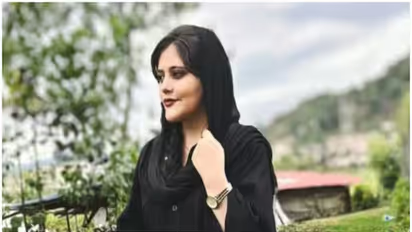'Woman should be treated like a flower', says Iran's Khamenei, Israel replies with a photo; see VIRAL post

Synopsis
Iran’s Supreme Leader, Ayatollah Ali Khamenei, has stirred debate with his remarks likening women to delicate flowers, emphasizing their need for care within the household rather than being treated as servants.
Iran’s Supreme Leader, Ayatollah Ali Khamenei, has stirred debate with his remarks likening women to delicate flowers, emphasizing their need for care within the household rather than being treated as servants. His comments, shared on December 18 via a post on X (formerly Twitter), coincide with the anniversary of the adoption of the Women’s Rights Bill by the United Nations General Assembly in 1979.
Khamenei stated, "In a family, men and women have distinct responsibilities. Providing for the family is the man's duty, while bearing children is the woman’s responsibility. Neither of these roles is superior to the other. The evaluation of rights between men and women cannot be based on this distinction."
"A woman is a delicate flower and not a housemaid. A woman should be treated like a flower in the home. A flower needs to be cared for. Its freshness and sweet scent should be benefitted from and used to perfume the air," Khamenei wrote on X.
The statement sparked immediate international attention, drawing sharp reactions from various quarters. Israel replied to Khamenei on X with a photo of a young woman wearing all black, her head covered. Israel neither named her nor did it caption the image.
The photo unmistakably depicted Mahsa Amini, the 22-year-old Iranian woman whose death in September 2022 while in the custody of Iran’s morality police ignited nationwide protests. Amini had been detained for allegedly violating the country’s strict dress code. Eyewitnesses reported that she was forcibly taken into custody, beaten, and sustained injuries that led to her falling into a coma. She died three days later, on September 16, 2022, sparking one of the most significant uprisings in Iran since the 1979 Islamic Revolution.
The protests, which spread like wildfire, symbolized a broader call for justice and freedom. Amini’s death became a rallying cry against the Iranian regime’s policies, particularly those enforcing strict moral codes on women.
Check the Breaking News Today and Latest News from across India and around the world. Stay updated with the latest World News and global developments from politics to economy and current affairs. Get in-depth coverage of China News, Europe News, Pakistan News, and South Asia News, along with top headlines from the UK and US. Follow expert analysis, international trends, and breaking updates from around the globe. Download the Asianet News Official App from the Android Play Store and iPhone App Store for accurate and timely news updates anytime, anywhere.